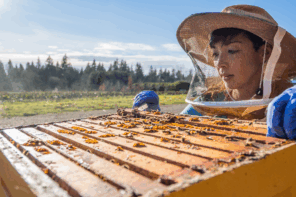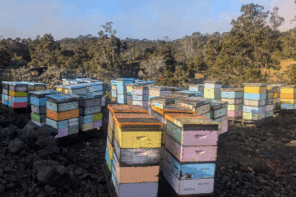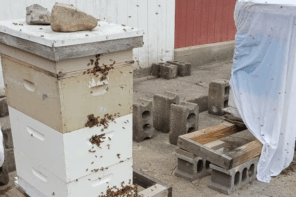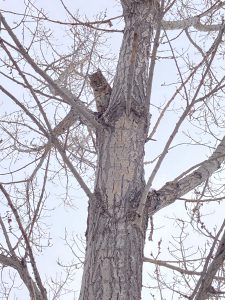
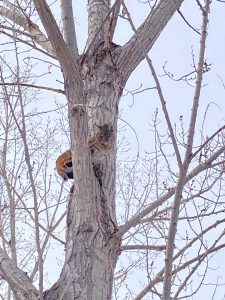 Our Bobcat
Our Bobcat
By: Ed Colby
Up the road at the nudie hot springs, the mercury hovers in the ‘teens. Shafts of early morning sunlight pierce a blanket of steam that rises from the water and frosts the trees an ethereal Winter-wonderland white.
As I crab-walk across the stone barrier between two outdoor pools, I lose my balance and turn turtle. I find this disconcerting. If you can picture an ancient beekeeper with not a stitch on, on his back, legs up in the air, kicking his feet to right himself, you’ve captured the moment.
These hot springs are not a mecca for the young and beautiful, although there are some of those. Mostly it’s a bunch of hippies-turned-dinosaurs who frequent this place. TM and I strike up a conversation with two silver-haired women from my generation. In my mind’s eye, I see them a half-century earlier, still fresh-faced and innocent, frolicking in some alpine meadow. They have flowers in their hair.
That was all in the morning. When I got home I learned that Pepper the blue heeler had treed our bobcat earlier in the day. The gal Marilyn took a video of him climbing down three hours later. I say “our” bobcat because he clearly thinks he’s part of the family. When he’s not racing up and down in front of the chicken fence panicking those poor darlings into flying the coop, Pepper’s likely got him treed. The bobcat seems to enjoy these little rituals.
Once he’s treed, he falls asleep up there. When I trained binoculars on him from the ground, he couldn’t keep his eyes open. And all this in broad daylight. Wild cats are supposed to be nocturnal, or at least crepuscular.
And bobcats are supposed to be much smaller than our feline friend – like about twice the size of a housecat.
Pepper weighs 50 pounds. I guess you could call him a medium-sized dog. My first encounter with the bobcat occurred when Pepper and I were headed up to the barn at twilight. Of course, Pepper ran ahead. I saw him 30 yards in front of me, nose to nose with another blue heeler. The other blue heeler looked bigger than Pepper.
Of course what I thought was another dog was the bobcat, and that time Pepper didn’t run him up a tree. The bobcat wasn’t about to play dog-and-cat games when he had a dead chicken on the ground in front of him. I called Pepper off, and we escaped yet another round of vet bills. Whew!
So this is a very large bobcat. He’s also very cute. To give him credit, he doesn’t kill for sport like a housecat. He only harvests our chickens when he’s hungry. Let’s say about one a day, until I put a stop to it. I locked the birds up tight.
Marilyn thought this was cruel, so I installed a “Critter Gitter” on the perimeter of their run. This is a sensor that shrieks when it detects motion. This way we can let the birds into their run during the day.
Well, why am I going to all this trouble? When I explained to Marilyn that I could quickly and efficiently deal with our uninvited guest, she didn’t take it well. “Don’t you dare!” she warned.
It’s February 10 as I write, and I recently popped the lids on my 70 overwintering honey bee colonies. It was a sunny 40-plus degree day, and the bees were mostly in the top supers. A few had taken flight. If I couldn’t see capped honey in that top super I laid down a sheet of newspaper and dumped some dry white sugar on it. I fed 10 colonies that way. Some folks insist you should never open a hive in cold weather, but not me. I just break that propolis seal under the inner cover and pry it off. I work pretty fast. Opening beehives in Wintertime is not ideal, but starvation is the end of the line. So take your pick.
I figure if a two-deep hive is dead heavy with honey in November, it ought to be fine until April, anyway. But honey bee colonies are like people – some have bigger appetites than others, and a few really power through their honey stores. This is an unpredictable occurrence that I don’t pretend to understand. It’s also part of the larger truth that bees will fool you every time.
It’s been a couple of weeks since we’ve seen the bobcat. Marilyn thinks our chickens are being denied a full and meaningful life if they don’t get out of their pen to peck and scratch. So yesterday she turned them loose into the wide world again. She thinks our kitty may be gone for good.
I’m not so sure. Predators are creatures of habit and come back for easy pickings.
But I know how to pick my battles. I’m going to let this one pass. Life is nothing if not a series of lessons. We’ll see how this one turns out.
Gentle reader, did you find this piece amusing, heartwarming, perhaps even instructive? If you clamor for more of Ed Colby’s writing, contact him at Coloradobees1@gmail.com. Ask him to promptly mail you a signed copy of A Beekeeper’s Life, Tales from the Bottom Board, a collection of his Bee Culture columns. Price: $25. Satisfaction guaranteed or your money back!







